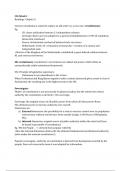Resume
Complete Summary Comparative Constitutional Law (Readings, Lectures, WGs)
- Cours
- Établissement
- Book
Complete summary of CCL-Comparative Constitutional Law, LLB year 1 University of Groningen (rug). Includes weekly readings, lectures, and wg questions. Grade: 9/10
[Montrer plus]




